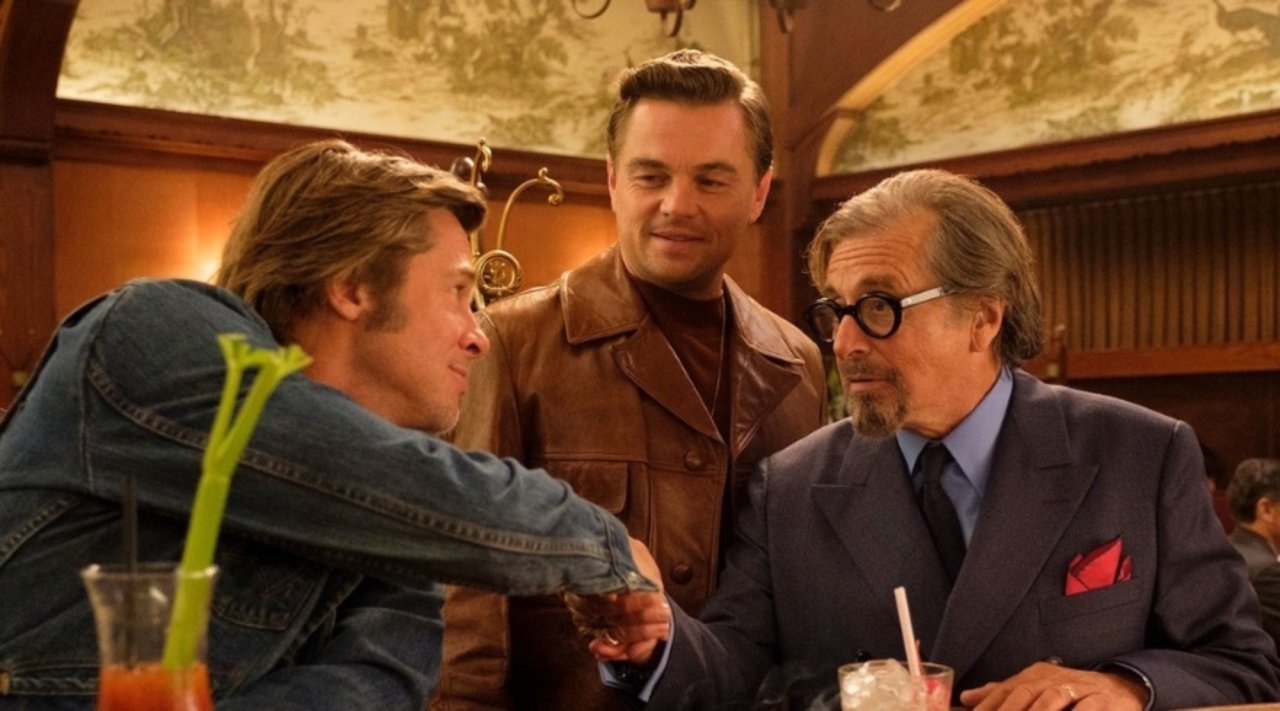The film starts with an interview of Rick Dalton (DiCaprio) and Cliff Booth (Pitt) on the set of the NBC show Bounty Law. The image of the two actors in the same frame alone is already worth hundreds of millions of dollars. The exuberance jumps off the screen, which is precisely what separates Once Upon a Time… in Hollywood from today’s blockbusters – its extravagant vision is one that is not necessarily done anymore (save maybe for franchises), but one that truly feels out of its time, and also feels like it’s of the time the film depicts. That’s what, essentially, is at the soul of this film: a time that has long died off where personality and name were enough for movies to make a buck.
But it’s not like that anymore. The old Hollywood is long gone, and the film focuses in on that transition through the Charles Manson murders of 1969, which is considered to be the last fallout of this old Hollywood where the industry’s “innocence” was lost. Later that year, Easy Rider would go onto make its debut at Cannes and usher in a new era of Hollywood, television will have already stolen a good chunk of cinema’s audience, and a new type of “star” will be discovered, which is precisely the struggle Dalton deals with in the film.
But what makes it seem so personal is the imbuing of the details into the film. Once Upon a Time takes the humanity of the characters of Jackie Brown, and permeates it with the exuberance of Pulp Fiction. Like Pulp, Tarantino makes his fascinations and obsessions of pop culture just as infectious. What are originally his passions and ideas ultimately feel like they are your passions. It’s like the sweet car your older brother drove or the badass music your older sister listened to. You don’t need to be told it’s cool, because you already perceive it as such. You don’t have to understand every reference or know exactly what his dialogue is saying, you just have to know that he knows what he’s saying. All these aspects, everything that makes his films special – dialogue, characters, obsessive mis en scene – all come to a head in this film, everything down to the old school box of Kraft mac n’ cheese.

There’s been rumors that his next film may very well be his last, or that Once Upon a Time might even be his swan song. And if he were to call it quits now – nine films and he’s out – I think I could be pretty happy with that. But much like in the film, Once Upon a Time wouldn’t just signify the end of his directing career, but potentially may be the death of the Hollywood auteur era that’s dominated the industry for so long.
Or potentially not, but I can tell you this much: there was a cultural revolution going down in Hollywood in 1969, and it’s not difficult to notice the one that’s going on right now. Signifying a new decade with the #MeToo movement, tentpole franchises and streaming services, it’s hard not to feel that, like in ’69, another “innocence” has been lost from this past decade. Movie stars are out, and the intimate character relationships of television is in. But it was in ’69 that the image of the “movie star” began to devolve. And it’s funny to see, given the parallel comparisons of the movie and what’s happening in Hollywood now, that the two leads in the film are quite literally the biggest movie stars still in the world. And maybe that’s what this film is truly about – the naturally selective growth of an ever-changing Hollywood and culture. This film may very well be the last of its kind – the two biggest actors in the world starring in a movie by the biggest director in the world. It feels like something that will never happen again.
In an age full of sequels, prequels, reboots, and remakes, it’s hard to get excited by anything that’s not from a truly singular vision. This film shows the end of its age, and it very much feels of that age. And I can’t help but feel that iconic movies like these, and I cringe when I write this, truly aren’t made anymore. Or maybe, they’re just in different forms. But they definitely don’t make movie stars anymore. Perhaps they never will again.
Photos courtesy of Sony/Andrew Cooper
